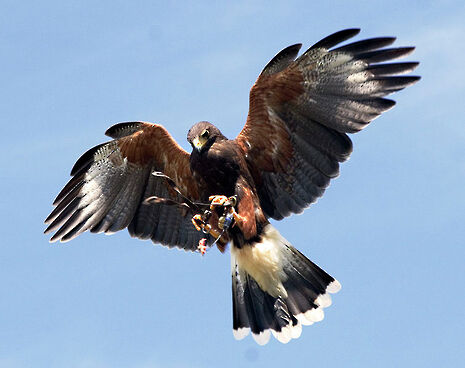News in Brief: Lent Week 6
An aerial solution to bird droppings, an exuberant table football team, pricey books and an honoured Fellow

Trinity hires hawk to clear off pests
Trinity College has adopted an unusual form of pest control – a Harris Hawk named Quinn. According to the Trinity website, Quinn is being used to scare away pigeons and seagulls, thus helping to keep Great Court free of excrement. Paul Thompson, who owns Quinn, said on the website: “The idea is to remind the pigeons that there is a bird of prey in the area, so they go somewhere else.” It has not all been plain sailing however – last week Quinn, while in pursuit of a pigeon, stopped Trinity’s clock, requiring it to be re-set.
History of the University sells for £2,400
A two-volume copy of A History of the University of Cambridge, Its Colleges, Halls, and Public Buildings has sold for £2,400 this week. Originally estimated to have a worth between £3,000-£5,000, the books were sold at Cheffins, an auctioneer. The books date from 1815, and were published by Rudolph Ackermann. In a statement to Cambridge News, Cheffins spokesperson Lisa Freeman-Bassett described the books as “rather special”, saying that they “illustrate a rare view of the University.” Also sold was a two-volume personal account of life at the University from 1827, entitled Alma Mater, or Seven Years at the University of Cambridge, by a Trinity-Man.
Table football club seeks European glory
Cambridge Table Football Club will be heading to the European Championships after finishing second in the national league. The club has various players who are or were at Cambridge University, including Yordan Zaykov. In a statement to ITV news he described the sport as “extremely competitive” because “there are different teams from many different countries” who will “have expertise in many different tables”. He went on to say: “I don’t think we’ll win but we’ll have a lot of fun.” The teams use complex tactics to secure victory, particularly in their choice of table: the standard pub table football table is Italian, which afford less control than tighter French tables.
Corpus historian wins non-fiction prize
Dr Christopher de Hamel, a Fellow of Corpus Christi, has been awarded the Duff Cooper Prize for 2016. His work Meetings with Remarkable Manuscripts claimed the prize, which rewards the best in non-fiction writing. His book explores various medieval manuscripts and explains their importance, and what they teach us about history. The Times Literary Supplement said of the book that “The prose crackles with excitement; the descriptions are vivid, the judgements sharp and incisive.” Also among the nominations for the prize was East West Street by Philippe Sands, who is an alumnus of the Corpus Christi.
 News / Cambridge University disables comments following Passover post backlash 24 April 2024
News / Cambridge University disables comments following Passover post backlash 24 April 2024 Comment / Gown vs town? Local investment plans must remember Cambridge is not just a university24 April 2024
Comment / Gown vs town? Local investment plans must remember Cambridge is not just a university24 April 2024 News / Fitz students face ‘massive invasion of privacy’ over messy rooms23 April 2024
News / Fitz students face ‘massive invasion of privacy’ over messy rooms23 April 2024 Interviews / Gender Agenda on building feminist solidarity in Cambridge24 April 2024
Interviews / Gender Agenda on building feminist solidarity in Cambridge24 April 2024 Comment / Does Lucy Cavendish need a billionaire bailout?22 April 2024
Comment / Does Lucy Cavendish need a billionaire bailout?22 April 2024





